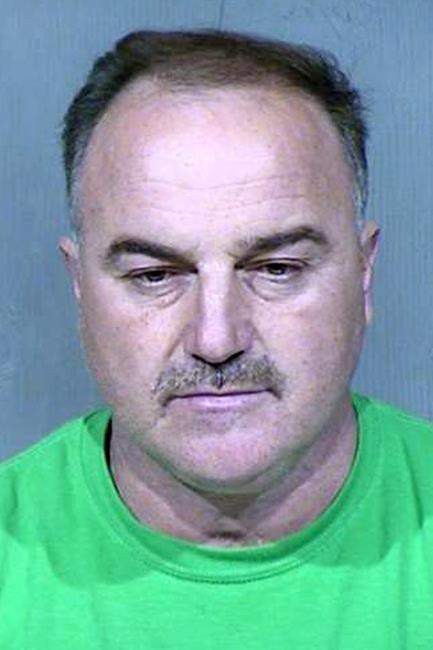
FILE - This undated booking photo provided by the Maricopa County Sheriff's Office shows Ali Yousif Ahmed Al-Nouri, who was arrested in January 2020 in Arizona as part of an extradition request made by the Iraqi government and has been accused of participating in the 2006 killing of two police officers in Iraq. A judge in Phoenix will hold a hearing on Thursday, July 15, 2021, over whether to sign off on a request to extradite Ahmed to Iraq. Ahmed has denied involvement in the killings. (Maricopa County Sheriff's Office via AP)
Republished July 15, 2021 - 5:18 PM
Original Publication Date July 14, 2021 - 9:11 PM
PHOENIX (AP) — A U.S. prosecutor trying to send a Phoenix driving school owner to Iraq to face charges in the 2006 killings of two Iraqi police officers acknowledged Thursday that statements made by people claiming to have witnessed the crimes contained inconsistencies but still urged a judge to sign off on the request.
Prosecutor Todd Allision said documents provided by the Iraqi government in its extradition request establish probable cause to support the two murder charges against Ali Yousif Ahmed Al-Nouri, an Iraqi native who came to the United States as a refugee in 2009 and became a U.S. citizen in 2015.
Ahmed is accused of participating in the two attacks on the streets of Fallujah as the leader of an al-Qaida group. Ahmed has denied being involved in the killings and being a member of a terror group.
Ahmed’s attorney, Jami Johnson, said some people who gave investigators information didn’t witness the shootings and learned about them secondhand. Johnson also said a man in Iraqi police custody who claimed to be a member of the terror group once told investigators that Ahmed took an officer’s gun during one of the killings, while saying another time that someone else made away with the weapon.
U.S. Magistrate Judge Michael Morrissey, who is expected to rule later, will determine whether there is probable cause to support each charge and if so, certify the extradition request. Ultimately, the decision on whether to send Ahmed to Iraq will be up to U.S. Secretary of State Antony Blinken’s office.
Johnson has said Ahmed wouldn’t get a fair trial amid the corruption in the Iraqi criminal justice system and would likely face execution if he were forced back to his native country.
The defense attorney has questioned why it took more than a decade for Iraqi authorities to formally accuse her client and criticized accounts of the killings from informants who had “everything to gain by delivering the Trump administration a supposed ‘terrorist refugee’ in an election year.”
The Trump administration had sharply criticized the Obama-era settlement program, questioning whether enough was done to weed out those with terrorist ties.
Nearly three months ago, a judge in Northern California refused to allow the extradition to Iraq of Omar Abdulsattar Ameen, who was accused of committing a killing for the Islamic State group.
The judge said cellphone evidence shows Ameen, who received refugee status in the U.S. in 2014 on the grounds he was a victim of terrorism, was in Turkey at the time of the slaying.
In Ahmed's case, in the first shooting he’s charged with, authorities say an attacker held a gun to a witness’ head, while another attacker started to fire on a police officer but had a malfunction with his gun.
Another attacker then killed police Lt. Issam Ahmed Hussein. The witness later identified Ahmed, who wasn’t wearing a mask, as the group’s leader, according to court records.
Four months later, Iraqi authorities say Ahmed and other men fatally shot Officer Khalid Ibrahim Mohammad as he was sitting outside a store.
A person who witnessed the shooting recognized Ahmed, whose mask had fallen off, as one of the assailants, according to court records.
Ahmed’s attorneys said the violence and turmoil in Iraq prompted their client to flee to Syria, where he lived in a refugee camp for three years before moving to the United States. Authorities said Ahmed spent time in a Syrian prison, though they couldn’t determine what landed him behind bars.
Defense attorneys say Ahmed volunteered in Phoenix’s refugee community and worked as a cultural adviser to the U.S. military, traveling to bases in other states to help military personnel as they prepared to deploy to the Middle East. He bought a home on the northwestern edge of metro Phoenix and operated a driving school serving largely Middle Eastern immigrants.
Prosecutors have questioned Ahmed’s credibility, saying he gave conflicting explanations about how he suffered gunshot wounds while in Iraq.
They said the criticism of the Iraqi criminal justice system and what Ahmed might face if he were sent back to Iraq don’t have bearing on whether Ahmed can be extradited.
News from © The Associated Press, 2021